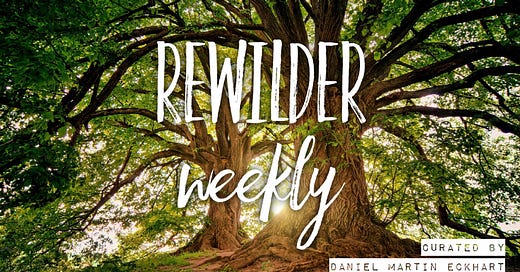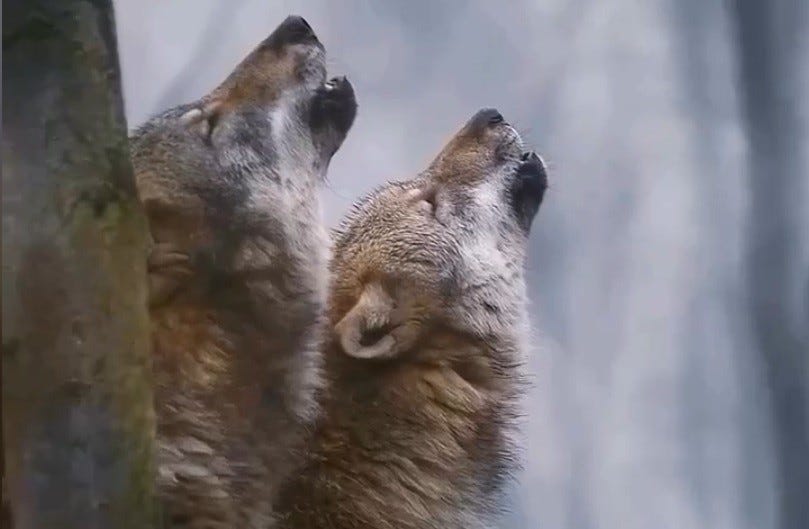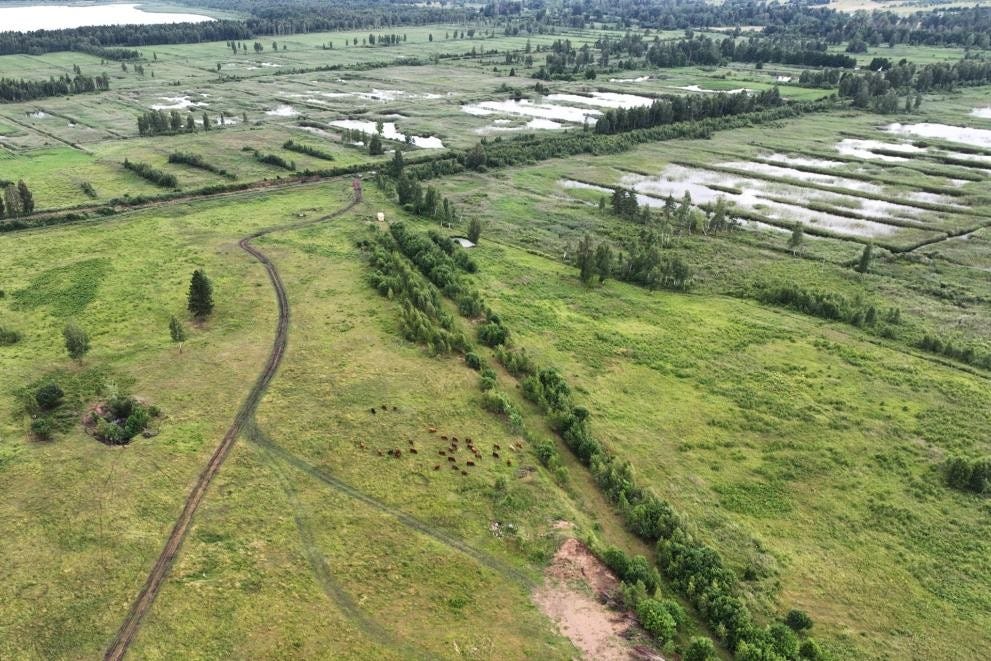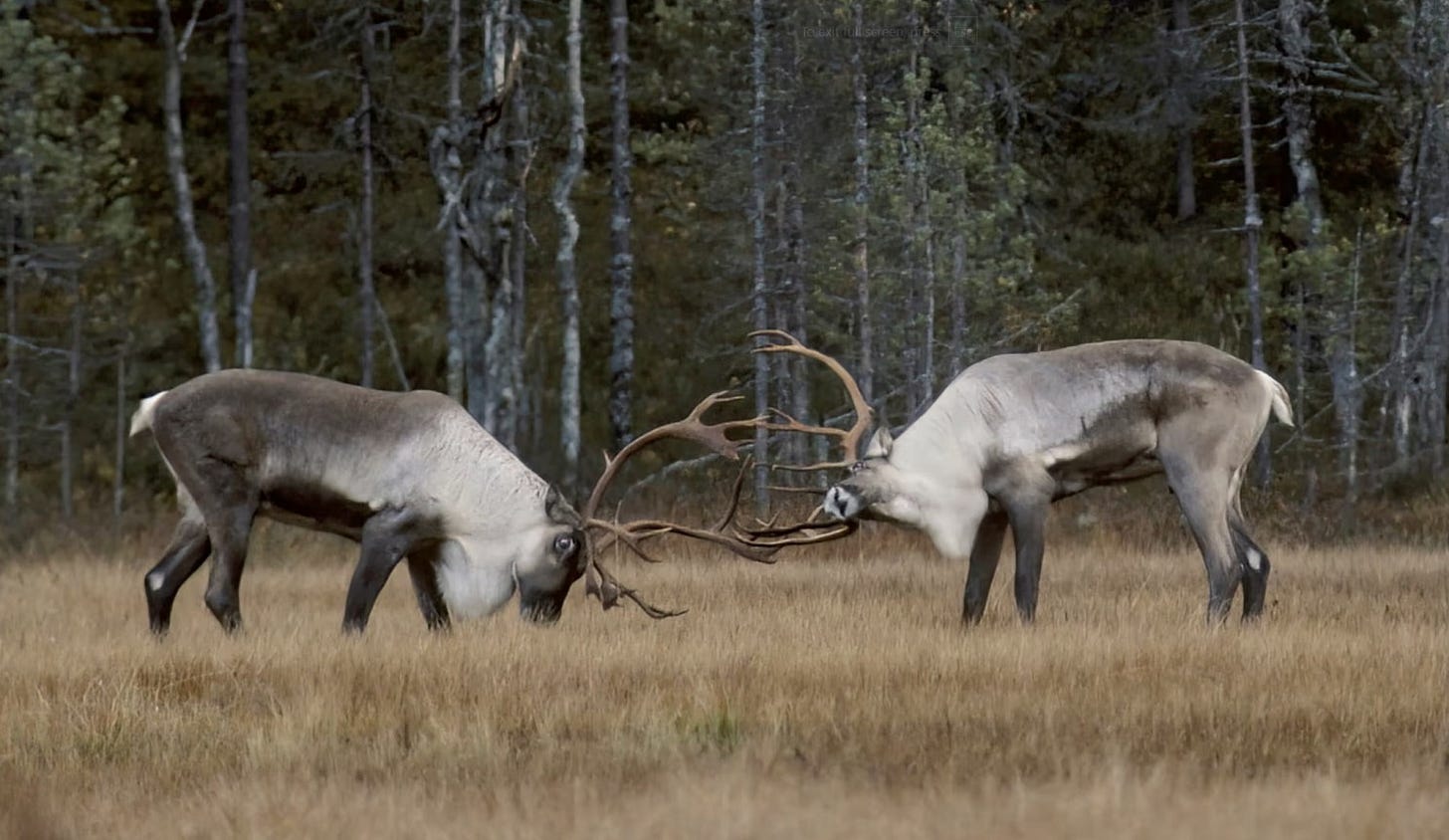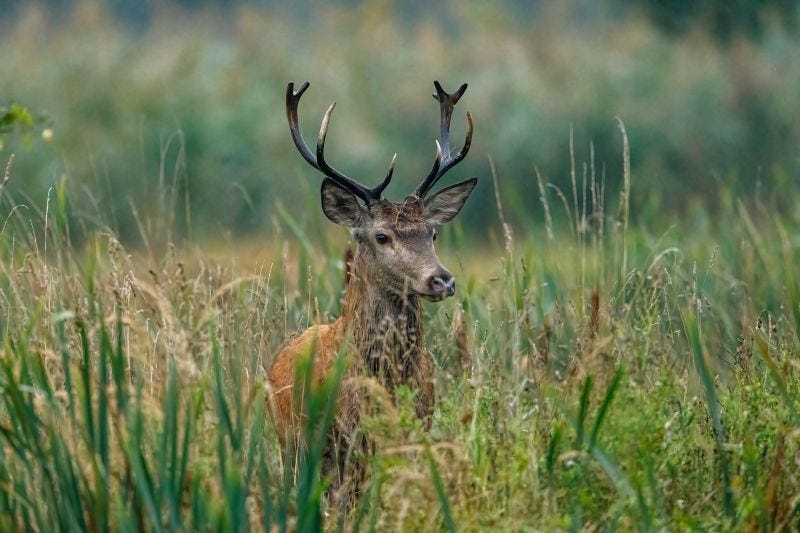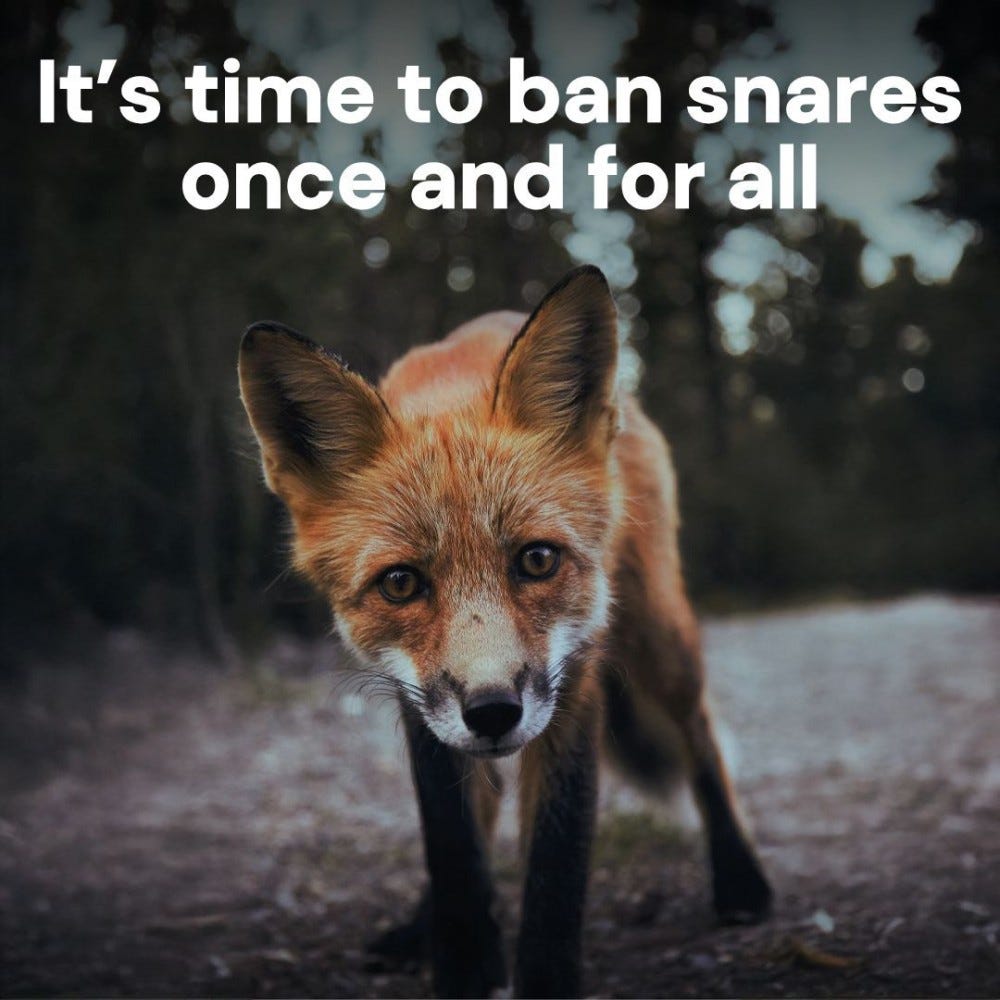Welcome to the latest edition of the Rewilder Weekly. I wish you all joyous festive days. May they be filled with peace and quiet and loved ones and lots of time to just breathe and just be - and may our collective 2025 bring about an ever more rewilded world!
👉 As a reminder: If you come across stories you'd like to see featured in an upcoming edition of the Rewilder Weekly, send them to me and I'll gladly do what I can.
1) My 2024 rewilding year
A look back at my 2024 rewilding year. There are many highlights, and most of those are because of you - yes YOU - the many amazing people fervently engaged in nature recovery efforts around the world. It's been both genuinely humbling and supremely inspiring to see what you do with relentless passion and unceasing stamina. The natural world is, today, in a better place because of you.
Thank you for being you and here's to scaling up rewilding efforts even more in 2025! Happy holidays to you and your loved ones. Cheers! D
2) Two wolves howling
A 30-second clip of two wolves howling. When I came across Oliver Bolton's post, I couldn't help but click to see and - more importantly - hear the wolves. No doubt you've heard a wolf howl before - but most likely not in nature. For most people today it is a sound that is surreal - unreal ... instead it should be something we've all heard, in real life. The sound, a sign of the presence of the wolf, would come with respect for nature - and every howl would be a strong message that nature is on the path of restoring itself. Listen to it. Seriously, listen to it. 30 seconds.
I find it stunningly beautiful - you may also call it eerie or haunting - and maybe, if I was out there in the wilderness and heard it, I would, too. And that's just as it should be. Wolves are powerful creatures, they are protectors, they are guardians, they are a keystone species. Yes, if I'd hear a wolf's howl in our woods, my eyes and eyes would be wide open with every walk. The dog would of course always be on the leash. I'd be far more aware of the world around me, I'd see more, I'd appreciate more. Wolves are no threat for human beings - they're known to want to steer clear of our species. But wolves are large carnivores and so we would walk and jog and hike with more awareness, more caution, more respect. We need to regrow humanity's respect for nature and the wolf helps us with that. As Luther Standing Bear is supposed to have said: "The elders were wise. They knew that a man's heart, away from nature, becomes hard. They knew that lack of respect for growing, living things, soon led to lack of respect for humans, too."
👉 Go here for post and howl clip
3) Rewilding Britain looks back at 2024 wins
I couldn't agree more with Rewilding Britain when they write that 2024 wasn't just a year of growth for them, "but for the rewilding community at large." I've been focused on rewilding communities around the world just about every day and truly feel that the movement isn't just inching forward, but expanding, scaling, going from strength to strength as the movement - and with the very word 'rewilding' has gone from niche to mainstream.
This year, Rewilding Britain has grown to a whopping 1'000 members, active rewilders focused on nature recovery on 181,128ha land and 506 km² seabed! Learn more about their multi-faceted work, take for example the 100-mile recovery effort of Sussex coastline, or the lynx feasability studies, the growth in rewilding jobs across Britain, or Wilder Blean and its bison, or Trees for Life and their Tauros plans, and, and and - lots of truly nature-recovery-good stuff happening.
👉 Go here for Rewilding Britains 2024 review
4) Wetland restoration in Latvia and Lithuania
Peat extraction in the Baltoji Vokė wetland complex began in the 1950s to heat Lithuania's capital - the consequence was the degradation of one of the country's biggest fen mires - a biodiversity-rich carbon sink wetland was destroyed - and dry - within decades. Thanks to the efforts of both humans and beavers, the site today is well on its way to being restored. Flora and fauna have returned - but there's still a lot of work to be done. I'm just thinking that, if the UK had chosen to remain in the EU, it might have greatly benefited from EU restoration mechanisms. You see, large-scale project in Latvia and Lithuania called LIFE Marsh Meadows is co-funded by the EU.
Life Marsh Meadows focuses on restoring hydrology and thus biodiversity across two large wetlands in three Natura 2000 territories - overall the focus is on the Sita and Pededze floodplain, and the Lubans and the aforementioned Baltoji Voke wetland complexes. They describe a wetland as "an area that is excessively wet or covered with a shallow layer of water. Wetlands include floodplain meadows, fens, raised bogs, coastal grasslands, naturally flooded forests and other habitats where land and water meet." Quite straightforward, right? Now ask yourself, just how often to you come across such wetlands it today's Europe? To increase farming productivity, and particularly for industrialized farming, we've drained/dried away, according to the Guardian, 50% of wetlands in Europe, the continental US and China over the past 300 years - and in the UK, Ireland and Germany that loss is at an incredible 75%.
5) The connection between folklore and rewilding
An insightful article by The Guardian about a Finnish folk singer and how songs and poetry - stretching back thousands of years - are connected with love and pride of nature. She sings a song that recounts how hunters go into the forest to hunt reindeer - and how these animals were honored givers of food, clothing and sense of place. Now, just like every other song, or poem, or story - you could just enjoy it and get on with your life ... but there's truth in them and, if you pay attention, they are calls to action in our time.
The last wild forest reindeer, the article explains, was shot in 1919. But the voices from the past, with their songs and tales, are powerful reminders of what was, and what could - and should - be again! Turns out that there now is indeed a plan to reintroduce reindeer where peatland has already been restored. The first reindeer are already putting in an appearance - and the hope is to have a herd of 300 reindeer again. The article highlights what's called "deep mapping" - something that very much has a focus on incorporating cultural history to understand every aspect of nature - and that must, of course, include local communities.
6) Rewilding an island
As mentioned in the article, rewilding an island 'is generally easier than the mainland, because they have a natural border." The island in question is Wirruwana (Dirk Hartog Island). With the arrival of Europeans to Australia, things went from pristine to destructive fast. On Wirruwana, it meant the arrival of overgrazing sheep and goats. And people living on the island brought along cats, too. It didn't take long from 10 of the 13 native mammal species to be wiped out.
Luckily, when the grazing lease was up in 2009, the government bought the island and it was given national part status then and there. The Return to 1616 project then began to return the island to a pre-European arrival status. The work entails returning native species, but also eradicating invasive species (both flora and fauna). Goats, sheep, and feral cats are now gone from the island. By now 8 species have been reintroduced and have reestablished themselves and the work is set to continue to 13 species by 2030.
7) Learning to coexist (again) with deer in the Danube Delta
The 'again' is the crucial word - we've been here before. Over the course of many centuries European populations managed to live alongside a wide variety of large fauna. Yes, we hunted, but we understood that coexistence supports our very own species. Ever since the 2nd industrial revolution, matters between our species and every other have gone from tense to worse - and now more and more people are rising up to restore nature, to restore balance.
In the Ukrainian part of the Danube Delta, rewilders are hard at work to being about that return of balanced coexistence. With deer making a big comeback, they find their food where they can get it - and people are now relearning to fence their gardens. In this story, find out more about the city of Vylkove (the Ukrainian Venice) - and how this city by the Danube embraces coexistence measures.
👉 Go here for post and article
8) Rewilding = Respect
In the second post of this week's edition I shared a quote by American Indian Luther Standing Bear about "respect for growing, living things" ... I believe that respect for nature is something that is built into the very essence of every rewilder. That means the any form of wanton destruction of land and sea, of flora and fauna, is abhorrent to us. Which is why I cannot just focus on the positive rewilding examples, the many projects around the world - but must also call out humanity's cruelty and utter disregard - whether the topic is shooting estates (or lets call them for what they are: 'joy of killing estates') - or, in this case - snares.
In their post, the League Against Cruel Sports calls out the practice that is still entirely commonplace in many countries. They write it from the point of view of the snared animal: "You're free, living your life, when suddenly — PAIN. A cruel device grips your body, cutting into your skin, tightening with every move. You're stuck, terrified, injured, and vulnerable." They write that Scotland and Wales have banned snares - but England has not. They're right - this practice must end. I'm a firm believer in the notion that you can tell a great deal about an individual by the way they treat animals. If you apply this to our whole species ... then we must admit that we are in a very, very dark place - and should want to do and be better!
👉 Go here for post and pictures - and link to write to your MP!
We end the newsletter as always with an artwork by Chilean science illustrator and painter Mauricio Alvarez (mauricio_alvarez_art on Instagram): This time beautiful rendering of a guanaco (lama guanicoe). Love this artwork - as always, thanks Mauricio! (It was made for Fondecyt Regular Research 1230020, from the Centro de Investigación en Ecosistemas de la Patagonia (Ciep) y Universidad Austral de Chile (Uach).)
That's it for this week's edition! For more rewilding insights and stories from around the globe, use the #rewilding hashtag and follow people, organizations and groups that are as passionate about rewilding as you are. Let's keep connecting and growing the movement!
Wishing you a good week.
Cheers,
D


